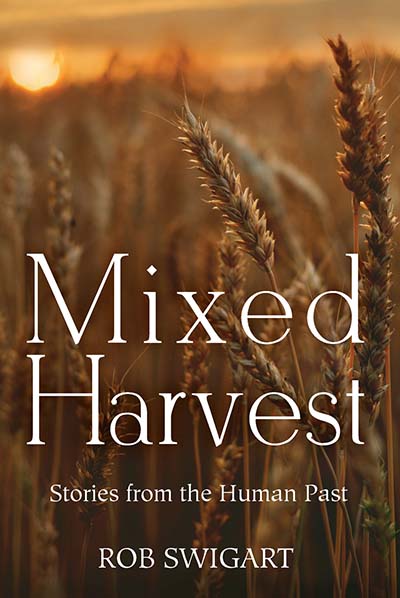The Origins of
Mixed Harvest

The recently published Mixed Harvest by Rob Swigart is Berghahn’s latest feat of historical fiction, digging into the deep past of human development and its consequences through a combination of storytelling and dialogue. From the first encounter between a Neanderthal woman and a Modern Human she called Traveler to the emergence and destruction of the world’s first cities, Mixed Harvest tells the tale of the Sedentary Divide, the most significant event since modern humans emerged. Swigart provides context for the book below.
Context for the Book
BY ROB SWIGART
I first visited Çatalhöyük, a Stone Age agglomeration of small houses in central Anatolia, in August of 1999. I arrived there after viewing a total solar eclipse from a hilltop to the east. A few days later, Turkey was struck by a devastating earthquake which left the city of İzmit nearly destroyed, Istanbul damaged, 17,000 people dead, and a quarter million homeless.
We can explain those events with talk of subduction zones or the shadow of the moon, but eight thousand years ago, the Neolithic proto-farmers of Çatalhöyük lived in a world subject to the meddlesome interference of powerful supernatural beings who could darken the sun or knock down a city. Such beings still cling to life, despite our acquired knowledge.
At a series of seminars at Çatalhöyük focused on the role of religion in the origins of the city, I, like most other people, came to see farming as the most dramatic and complex transformation of the modern human species since we first wandered out of Africa. I think of this period as the Sedentary Divide.
In the millennia leading up to it, humans lived in small, independent bands, followed food as it migrated or ripened, and acquired a deep understanding of the natural world. Fourteen thousand years ago, the Holocene arrived. The climate improved. Domestication of grains and herd animals and the technologies of the plow and irrigation got almost everybody on the planet excited about farming. Wow! The food stayed nearby, so houses could be permanent and cluster together.
That’s the Sedentary part. There was lots of food, barring pests, drought, flood, or disease. Population increased and the adoption of farming took over everywhere in the world, which suggests it was inevitable.
That does not make it smart. If only we had known! Its unintended consequences fill the news cycle with melting permafrost and climate migrations, micro plastics and toxic chemicals, emergent pandemics and drug-resistant microbes. The human species continues unchecked.
After the Divide, people could imagine those meddlesome gods into being. Private property evolved, social organizations were stratified. Half the species was oppressed out of jealousy of their reproductive power. The physical environment became human-built under the rule of the straight line. Humans outstripped earth’s carrying capacity over and over ever since. Domesticated plants continue to alter diet and we can’t evolve fast enough to keep up, thus gifting ourselves with modern maladies like cancer and heart disease.
Then came ceramics and metallurgy, cities, writing, monarchy, and the rapidly accelerating glories of technology, not to mention a spiritual transformation into authoritative book religions.
Out of those meetings in Turkey emerged a broader narrative, a series of stories about the deep time before, during, and after the switch to farming called Mixed Harvest. Harvest follows planting. Among the benefits are soaring cathedrals, orchestral music, printed books, long-form television series, chocolate mousse. Unintended consequences include plagues, pollution, climate change, overpopulation, inequality, and war. Thus, the harvest is mixed.
Story narrows and focuses the view. It asks questions and speculates possibilities. It is not history, but imagination:
When a modern human encountered a Neanderthal band, for instance, what might have happened? Were such meetings always violent? Europeans today carry a small percentage of Neanderthal genes, which suggests a different outcome.
If a member of a hunter-gatherer band became aggressive, how might the band respond? In a world with few people, violence might not be the best course for survival. It is possible to picture a different outcome. Physical evidence in the archaeological record will neither confirm nor deny. Story offers alternatives.
The caves of Europe are rich in magnificent wall paintings up to forty-thousand years old. Who painted them, and what did they mean to the painter? There are suggestions, but no certainties. Stories bring the possibilities to life.
Once cities emerged in southern Iraq, they grew in size and complexity and became breeding grounds for inequality and patriarchy. Writing commanded the levers of control, and when warfare destroyed a city, masses suffered, which has left a mark on the human psyche.
We live with multiple consequences. Can we learn from the deep past, the archaeology, prehistory, anthropology, cave art, from the whole palimpsest of mankind’s writing on the earth to help us plan a better future?
I like to think so.
ABOUT THE AUTHOR
ROB SWIGART has a doctorate in comparative literature. Since then he’s worked as a technical writer, computer journalist, designer and scriptwriter for computer games. With Portal for Activision, he pioneered computer narrative and later served as secretary of the board of the Electronic Literature Organization. For a dozen years, he was a Research Affiliate at the Institute for the Future.
Because of his lifelong interest in the deep past, he described this work as a kind of future archaeology. In the first decade of the 21st century, he turned his attention full-time to archaeology and wrote two textbook-novels, Xibalba Gate: A Novel of the Ancient Maya and Stone Mirror: A Novel of the Neolithic, while a visiting scholar at the Stanford Archaeology Center. His new novel Mixed Harvest is a collection of short fiction that chronicles mankind’s mistaken adoption of agriculture.
Listen to Swigart’s reading of “Bringer,” Chapter 2 of Mixed Harvest here.
